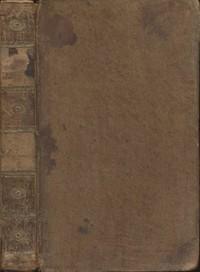|
|
Read this ebook for free! No credit card needed, absolutely nothing to pay.Words: 74083 in 19 pages
This is an ebook sharing website. You can read the uploaded ebooks for free here. No credit cards needed, nothing to pay. If you want to own a digital copy of the ebook, or want to read offline with your favorite ebook-reader, then you can choose to buy and download the ebook.

: The Lives of the Poets of Great Britain and Ireland (1753) Volume IV. by Cibber Theophilus - Poets English Biography Early works to 1800; Poets Irish Biography Early works to 1800 Biographies@FreeBooksTue 06 Jun, 2023 This play took birth from principles of truth, To make amends for errors past, of youth. A bard that's now no more, in riper days, Conscious review'd the licence of his plays: And tho' applause his wanton muse had fir'd, Himself condemn'd what sensual minds admir'd. At length he own'd that plays should let you see Not only what you are, but ought to be: Though vice was natural, 'twas never meant, The stage should shew it, but for punishment! Warm with that thought his muse once more took flame, Resolv'd to bring licentious life to shame. Such was the piece, his latest pen design'd', But left no traces of his plan behind. Luxurious scenes, unprun'd, or half contriv'd; Yet, through the mass, his native fire surviv'd: Rough as rich oar, in mines the treasure lay, Yet still 'twas rich, and forms at length a play. In which the bold compiler boasts no merit, But that his pains have sav'd you scenes of spirit. Not scenes that would a noisy joy impart, But such as hush the mind, and warm the heart. From praise of hands, no sure account he draws, But fix'd attention is, sincere applause. If then his art Can to those Embrion scenes new life impart; The living proudly would exclude his lays, And to the buried bard resign the praise. Sir John indeed appears to have been often sensible of the immorality of his scenes; for in the year 1725 when the company of comedians was called upon, in a manner that could not be resisted, to revive the Provok'd Wife, the author, who was conscious how justly it was exposed to censure, thought proper to substitute a new scene in the fourth act, in place of another, in which, in the wantonness of his wit and humour, he had made a Rake talk like a Rake, in the habit of a Clergyman. To avoid which offence, he put the same Debauchee into the Undress of a Woman of Quality; for the character of a fine lady, it seems, is not reckoned so indelibly sacred, as that of a Churchman. Whatever follies he exposed in the petticoat kept him at least clear of his former imputed prophaneness, and appeared now to the audience innocently ridiculous. This ingenious dramatist died of a quinsey at his house in Whitehall, on the 26th of March 1726. He was a man of a lively imagination, of a facetious, and engaging humour, and as he lived esteemed by all his acquaintance, so he died without leaving ons enemy to reproach his memory; a felicity which few men of public employments, or possessed of so distinguished a genius, ever enjoyed. He has left behind him monuments of fame, which can never perish but with taste and politeness. Sir RICHARD STEELE, Knt. This celebrated genius was born in Ireland. His father being a counsellor at law, and private secretary to James duke of Ormond, he went over with his grace to that kingdom, when he was raised to the dignity of lord lieutenant. Our author when but very young, came over into England; and was educated at the Charter-House school in London, where Mr. Addison was his school-fellow, and where they contracted a friendship which continued firm till the death of that great man. His inclination leading him to the army, he rode for some time privately in the guards; in which station, as he himself tells us, in his Apology for his Writings, he first became an author, a way of life in which the irregularities of youth are considered as a kind of recommendation. Mr. Steele was born with the most violent propension to pleasure, and at the same time was master of so much good sense, as to be able to discern the extreme folly of licentious courses, their moral unfitness, and the many calamities they naturally produce. He maintained a perpetual struggle between reason and appetite. He frequently fell into indulgencies, which cost him many a pang of remorse, and under the conviction of the danger of a vicious life, he wrote his Christian Hero, with a design to fix upon his own mind a strong impression of virtue and religion. But this secret admonition to his conscience he judged too weak, and therefore in the year 1701 printed the book with his name prefixed, in hopes that a standing evidence against himself in the eyes of the world, might the more forcibly induce him to lay a restraint upon his desires, and make him ashamed of vice, so contrary to his own sense and conviction. This piece was the first of any note, and is esteem'd by some as one of the best of Mr. Steele's works; he gained great reputation by it, and recommended himself to the regard of all pious and good men. But while he grew in the esteem of the religious and worthy, he sunk in the opinion of his old companions in gaiety: He was reckoned by them to have degenerated from the gay, sprightly companion, to the dull disagreeable pedant, and they measured the least levity of his words and actions with the character of a Christian Hero. Thus he found himself slighted, instead of being encouraged for his declarations as to religion; but happily those who held him in contempt for his defence of piety and goodness were characters, with whom to be at variance is virtue. But Mr. Steele, who could not be content with the suffrage of the Good only, without the concurrence of the Gay, set about recovering the favour of the latter by innocent means: He introduced a Comedy on the stage, called Grief A-la-Mode, in which, tho' full of incidents that move laughter, and inspire chearfulness, virtue and vice appear just as they ought to do. This play was acted at the Theatre in Drury Lane 1702, and as nothing can make the town so fond of a man, as a successful play; so this, with some other particulars enlarged on to his advantage, recommended him to king William, and his name to be provided for was in the last table-book worn by his majesty. He had before this time procured a captain's commission in the lord Lucas's regiment, by the interest of lord Cutts, to whom he dedicated his Christian Hero, and who likewise appointed him his secretary: His next appearance as a writer, was in the office of Gazetteer, in which he observes in the same apology for himself, he worked faithfully, according to order, without ever erring against the rule observed by all ministers, to keep that paper very innocent, and insipid. The reproaches he heard every Gazette-day against the writer of it, inspired him with a fortitude of being remarkably negligent of what people said, which he did not deserve. In endeavouring to acquire this negligence, he certainly acted a prudent part, and gained the most important and leading advantage, with which, every author should set out. Whoever writes for the public, is sure to draw down envy on himself from some quarter or other, and they who are resolved never to be pleased, consider him as too assuming, and discover their resentment by contempt. How miserable is the state of an author! It is his misfortune in common with the fair sex, To please too little, or to please too much. If he happens to be a successful writer, his friends who become then proud of his acquaintance, flatter him, and by soothing his vanity teach him to overrate his importance, and while he grasps at universal fame, he loses by too vigorous an effort, what he had acquired by diligence and application: If he pleases too little, that is, if his works are not read, he is in a fair way of being a great loser by his attempt to please. Mr. Steele still continued to write plays. In the year 1703 his Comedy, entitled the Tender Husband, or the Accomplished Fools, was acted at the Theatre in Drury-Lane; as his Comedy of the Lying-Lovers, or the Ladies Friendship, was likewise the year following, both with success; so that his reputation was now fully established. In the year 1709 he began the Taller, the first of which was published on Tuesday April the 12th, and the last on Tuesday January the 2d, 1710-11. This paper greatly increasing his fame, he was preferred to be one of the commissioners of the stamp office. Upon laying down the Tatler, he set up, in concert with Mr. Addison, the Spectator, which was continued from March the 1st, 1710-11, to December the 6th 1712; and resumed June 18th 1714. and continued till December the 20th, the same year. Free books android app tbrJar TBR JAR Read Free books online gutenberg More posts by @FreeBooks
: Crusoes of the Frozen North by Stables Gordon - Children Conduct of life Juvenile fiction; Adventure stories; Siblings Juvenile fiction; Voyages and travels Juvenile fiction; Rescues Juvenile fiction; Sailors Juvenile fiction; Uncles Juvenile fiction; Stow@FreeBooksTue 06 Jun, 2023

: A Residence in France During the Years 1792 1793 1794 and 1795 Complete Described in a Series of Letters from an English Lady: with General and Incidental Remarks on the French Character and Manners by Biggs Charlotte Gifford John Editor - France History@FreeBooksTue 06 Jun, 2023
|
Terms of Use Stock Market News! © gutenberg.org.in2025 All Rights reserved.






